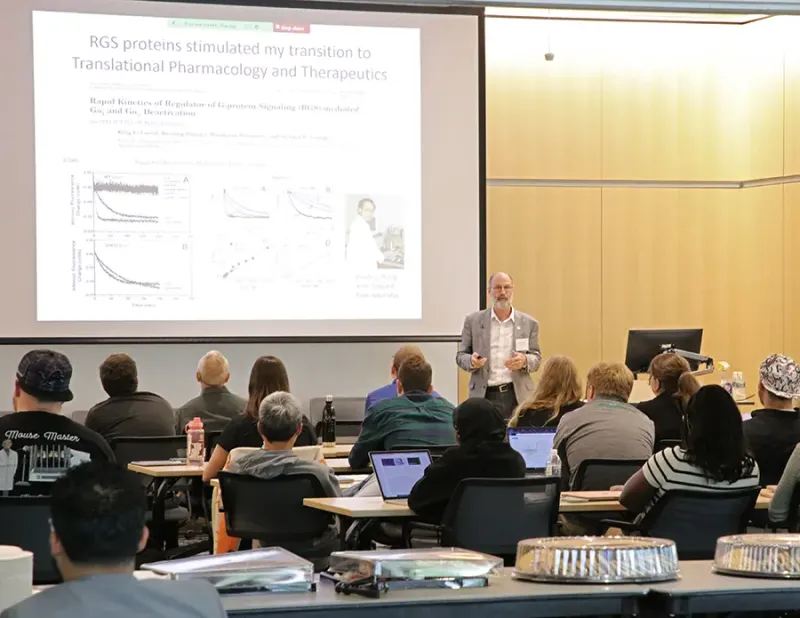
IPSTP Retreat Shares Updates, Research, and Honors One of its Shining Lights
For Ph.D. candidate Ebenezar Okoyeocha, his involvement in Michigan State University’s Integrated Pharmacological Sciences Training Program (IPSTP) is a vital step toward his career as a clinical scientist.
"It's been an invaluable experience," he said. “The program offers training that complements the skills I’m gaining in my lab.”
The IPSTP is an interdisciplinary training program funded by an NIH T32 training grant. The program is directed by Dr. Anne Dorrance and Dr. Gina Leinninger and is open to Ph.D. students from seven Ph.D. programs — Pharmacology and Toxicology; Biochemistry and Molecular Biology, Chemistry; Chemical Engineering and Material Science; Microbiology Genetics and Immunology, Neuroscience; and Physiology. ** Students focus on two unique areas of research: in vivo pharmacology approaches and drug discovery. Trainees choose a research mentor from among 47 training faculty in the seven participating programs.
The program prepares graduate students for successful research careers in pharmacological science. The students learn to work in interdisciplinary teams and gain experience in research methods through a series of bootcamps.
The students also participate in a grant writing workshop lead by Dr. Leinninger. This workshop prepares students to submit independent fellowship applications, and multiple students have received their own funding after working through this part of the program.
Students and faculty involved in IPSTP gathered recently for a retreat to share updates and research and to offer an emotional thank you to one of the program’s driving forces, Dr. Richard Neubig, who recently retired.
His keynote address, titled “My Journey Through G Proteins and Beyond,” focused on his circuitous lifelong trip through chemistry and medicine and on to a change of course where his interest for the past 20 years has focused on drug discovery and his creation at MSU of the Assay Development and Drug Repurposing Core (ADDRC).
“It’s been an amazing trip,” he said. “It’s been fantastic.”
The retreat also highlighted individual oral student presentations from Annie Needs (Mentor is Dr. Daniel Woodring); Alex Chapman (Mentor is Dr. Geoffroy Laumet); Caitlin Schneider (Mentors are Dr. James Luyendyk and Dr. Adam Lauver); Afolashade Onunkun (Mentor is Dr. Adam Lauver); Alexis Boron, (Mentor is Dr. Nathan Tykocki); and Tessa Jordan (Mentor is Dr. Sophia Lunt), as well as poster presentations.
Tessa Jordan received the award for best oral presentation; Michael Kubik earned the IPSTP best poster award; and Nana Kwame Kwabi Boateng was named best non-IPSTP poster. Each received $100.
Okoyeocha was one of the students whose poster was selected by the IPSTP retreat planning committee to display and explain his PhD research on the chemical agent chloropicrin and its impact on the eye. Okoyeocha has been lucky enough to present his thesis research at several scientific meetings around the US. Since arriving at MSU three years ago, with the support of IPSTP, his research has significantly benefited from the connections and insights gained through presenting at conferences nationwide.
“I have a lot of posters,” he said with a smile. “But it’s a good way to communicate research and it’s a good way to collaborate. And the IPSTP is the best way for me to prepare for being a clinical scientist.”